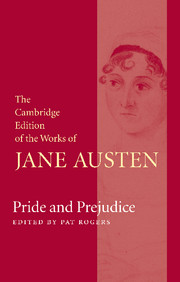Book contents
- Frontmatter
- Contents
- General Editor’s Preface
- Acknowledgements
- Chronology
- Introduction
- Note on the Text
- Pride and Prejudice
- Pride and Prejudice: Volume I
- Pride and Prejudice: Volume II
- Pride and Prejudice: Volume III
- Corrections and Emendations to 1813 text
- Appendix 1 Thomas Egerton and the Publication History
- Appendix 2 Legal and Military Background
- Appendix 3 Pemberley and its Models
- Appendix 4 Note on the second and third editions of Pride and Prejudice
- Abbreviations
- Explanatory Notes
Chapter 17
Published online by Cambridge University Press: 19 December 2020
- Frontmatter
- Contents
- General Editor’s Preface
- Acknowledgements
- Chronology
- Introduction
- Note on the Text
- Pride and Prejudice
- Pride and Prejudice: Volume I
- Pride and Prejudice: Volume II
- Pride and Prejudice: Volume III
- Corrections and Emendations to 1813 text
- Appendix 1 Thomas Egerton and the Publication History
- Appendix 2 Legal and Military Background
- Appendix 3 Pemberley and its Models
- Appendix 4 Note on the second and third editions of Pride and Prejudice
- Abbreviations
- Explanatory Notes
Summary
ELIZABETH's impatience to acquaint Jane with what had happened could no longer be overcome; and at length resolving to suppress every particular in which her sister was concerned, and preparing her to be surprised, she related to her the next morning the chief of the scene between Mr. Darcy and herself.
Miss Bennet's astonishment was soon lessened by the strong sisterly partiality which made any admiration of Elizabeth appear perfectly natural; and all surprise was shortly lost in other feelings. She was sorry that Mr. Darcy should have delivered his sentiments in a manner so little suited to recommend them; but still more was she grieved for the unhappiness which her sister's refusal must have given him.
“His being so sure of succeeding, was wrong,” said she; “and certainly ought not to have appeared; but consider how much it must increase his disappointment.”
“Indeed,” replied Elizabeth, “I am heartily sorry for him; but he has other feelings which will probably soon drive away his regard for me. You do not blame me, however, for refusing him?”
“Blame you! Oh, no.”
“But you blame me for having spoken so warmly of Wickham.”
“No—I do not know that you were wrong in saying what you did.”
“But you will know it, when I have told you what happened the very next day.”
She then spoke of the letter, repeating the whole of its contents as far as they concerned George Wickham. What a stroke was this for poor Jane! who would willingly have gone through the world without believing that somuch wickedness existed in the whole race of mankind, as was here collected in one individual. Nor was Darcy's vindication, though grateful to her feelings, capable of consoling her for such discovery. Most earnestly did she labour to prove the probability of error, and seek to clear one, without involving the other.
“This will not do,” said Elizabeth. “You never will be able to make both of them good for any thing.
- Type
- Chapter
- Information
- Pride and Prejudice , pp. 248 - 253Publisher: Cambridge University PressPrint publication year: 2006

